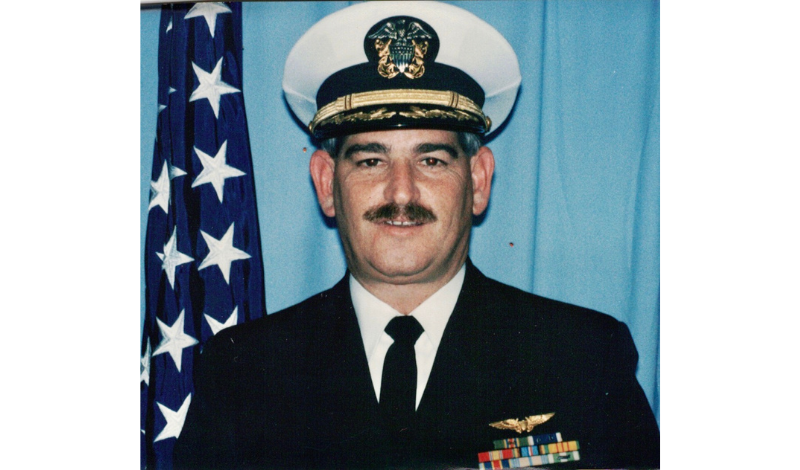
It is with a heavy heart that LCFA announces the passing of David “Larry” Gershon, a beacon of hope and a cherished member of our Veteran’s Breath of Honor Speakers Bureau. Larry’s story exemplified the resilience and unwavering spirit of those battling lung cancer. His journey, marked by service, love, and a commitment to supporting others, touched the lives of many. Larry’s legacy of advocacy and his dedication to the lung cancer community will continue to inspire us.
The lung cancer diagnosis that Larry Gershon, then 65, would receive would be among the most dire ones a patient could get. Larry, a retired Navy Captain who had served as a Naval Flight Officer for most of his career, was no stranger to challenging situations. His flying experience as a Tactical Coordinator on the P-3 Anti Submarine Warfare Aircraft had prepared him for high-stakes scenarios, but nothing could have prepared him for this battle.
An Unexpected Battle: A Veteran’s Lung Cancer Diagnosis
Larry’s journey with lung cancer began unexpectedly when he developed a terrible cold. The cold turned into asthma – something he had experienced before – which led him to an urgent care visit. As Larry was leaving, almost as an afterthought, the doctor suggested they do a chest x-ray to check for pneumonia. While the imaging was clear for pneumonia, it revealed a spot on his upper right lung – an incidental finding that needed to be explored.
Within a few weeks, Larry underwent both a CT and PET scan, as well as a surgical biopsy. The diagnosis was cancer. Soon after, a brain MRI revealed metastasis to his brain. Larry had stage 4 non-small cell lung cancer. It was early 2013, and the only treatment option at the time was intravenous chemotherapy.
Navigating Treatment: How Military Experience Empowered This Veteran Lung Cancer Fighter
As a veteran who had retired from the military in 1995, Larry was accustomed to facing challenges head-on. He approached his cancer treatment with the same determination and discipline that had characterized his military career. After four rounds of chemotherapy, his scans showed improvement; the metastases to his brain were resolved, but the primary tumor remained. For the following seven months, Larry continued on a course of maintenance chemotherapy which, while it did not completely eradicate the tumor, did shrink it.
While undergoing chemotherapy treatment, Larry’s medical team sent out a tissue sample for genomic biomarker testing. The results came back positive for the EGFR mutation. This was important information regarding his treatment plan. It is known in the medical community that EGFR does not tend to respond to chemotherapy. Fortunately, however, several targeted therapies were showing promise in patients.
By this time, he was feeling pretty terrible from the side effects of the chemo. His fatigue had become untenable so, at the suggestion – and encouragement – of his oncologist, Larry took a chemo-holiday. It was now January 2014, and Larry’s scans remained stable for nearly the entire year with no systemic or brain progression. This is unusual and, as Larry says, “incredibly fortunate”. But, as stage 4 lung cancer will do, a new set of scans showed a return of the original brain metastasis as well as two other spots. It was unanimously attributed to having stopped chemotherapy treatment.
Precision Medicine: An Empowered Veteran’s Approach to Targeted Therapies
With the knowledge that lung cancer with the EGFR mutation is not generally responsive to chemotherapy, Larry’s medical team opted for stereotactic brain radiation. As a result of the treatment, all three tumors stopped growing. Unfortunately, regrowth began a few months later. So, too, did systemic recurrence, with evidence of disease in the primary lung tumor, lymph nodes, adrenal glands, and pelvis. In January 2015 Larry was prescribed first-generation oral medication that targeted EGFR. His scans were remarkable: all locations were resolved, nothing showed up on his PET scan, and there was no metabolic activity. Larry remained stable for 20 months.
It wasn’t until September 2016 that scans showed significant progression in all the previous sites and increased lymph node involvement. At this point, Larry started on a second targeted therapy. Because the brain metastasis continued to grow – a common occurrence with EGFR patients – Larry was scheduled for brain surgery.
“Of course I was upset about it. The thought of brain surgery is terrifying. My doctor assured me it was not going to be as bad as I was anticipating…and he was right. I had the surgery at * a.m. on a Friday morning, by late that afternoon I felt good. The following morning I was walking and, truthfully probably could have gone home, but we decided to give it one more night. I went home Sunday morning, began physical therapy for balance and was good to go!”
Resilience in the Face of Setbacks: A Veteran Lung Cancer Survivor’s Ongoing Fight
Today, Larry is stll on that same oral therapy. For the first 5 years, his scans were stable and there was no progression of disease. As time progressed, he developed oligoprogression: a fairly new clinical concept that describes cancer that has progressed in limited sites. In Larry’s case, new lymph node involvement and spots on the adrenal gland. He underwent stereotactic body radiation and each time, the issues were resolved.
The blood biopsy showed no new mutations and the tissue biopsy indicated a progression mutation, but nothing significant enough to change the treatment plan. For the following two years, Larry had radiation which would slow down, but not prevent progression.
Larry remained stable until January 2023 when his PET scan showed a new tumor in the same lung, but now in the lower right. The pathology report from the biopsy was consistent with the older biopsies; EGFR plus progression mutation and MET amplification meaning there are extra copies of the gene MET in the tissue. Fortunately, there was a targeted therapy designed for other MET mutations that had proven efficacy with Larry’s. After adding this to his other two therapies, Larry’s first scan showed halted progression. While he did suffer from side effects of edema and significant fatigue, Larry was thrilled with this news.
Throughout 2023 Larry has scans every three months and, given the results, was able to reduce his second medication not once, but twice. As a result of this, his quality of life improved as did the fatigue and edema. It took a lot of appointments, drugs, and medical interventions, but things were on a definite upswing.
Larry’s scans remained good until April 2024. A PET scan revealed a new localized oligoprogression in his third right back rib. The cancer had spread to his bones. Following several months of radiation therapy, Larry’s July scans showed reduction on disease.
“When I was initially diagnosed I was a self-employed print broker. I was really concerned about the financial impact. My wife and I were used to living on two incomes. Once I started treatment it was rough. I would have an infusion on Tuesday which, it turns out, I was allergic to. So, they had to give me some extra steroids. I would be high until Friday and then sleep all weekend. By Monday I was okay, but then had to start over again. Things worked out okay… I would say I am semi-retired. I’ve got a few clients I still work with but on a much smaller scale.”
The Power of Hope: An Empowered Veteran’s 11-Year Lung Cancer Journey
There is no question that the past 11 years since Larry’s diagnosis have been challenging. The edema, fatigue, and anxiety – all common side effects of any cancer diagnosis – have played a large role in his daily life. As he and his wife approach their 50th wedding anniversary, Larry is grateful. “As I have progressed, so too has treatment in advance of me needing it.”
Finding Purpose: How This Empowered Veteran Supports Fellow Lung Cancer Patients
About a year after his diagnosis, Larry found a lung cancer advocacy organization with a mission to help lung cancer patients one-on-one. There he became empowered and educated about his disease. He learned to seek second opinions, create a multi-disciplinary team, and learn from thought leaders. But perhaps most importantly: it gave him hope.
“For the past several years I have been a phone buddy for other lung cancer patients with the EGFR mutation. It has been so impactful to focus on someone other than myself; to educate, comfort, and prepare people for the lung cancer journey. Lung cancer is the thing I never wanted that has given me so much. I am looking forward to being a member of the LCFA Speaker’s Bureau.”
The Power of Hope: An Empowered Veteran’s Lung Cancer Journey
Throughout his cancer journey, Larry drew on the resilience and adaptability he had developed during his years in the Navy. His experience as a Naval Flight Officer had taught him the importance of staying calm under pressure and making quick, informed decisions – skills that proved invaluable as he navigated the complexities of cancer treatment.
Today, as Larry approaches his 50th wedding anniversary, he reflects on the challenges and triumphs of the past 11 years since his diagnosis. His military background has undoubtedly influenced his approach to fighting cancer, bringing a unique perspective to his role as a phone buddy for other lung cancer patients with the EGFR mutation.
From Naval Flight Officer to Lung Cancer Advocate: A Veteran’s New Mission
“Lung cancer is the thing I never wanted that has given me so much. I am looking forward to being a member of the LCFA Speaker’s Bureau, where I can share not only my experiences as a cancer patient but also how my military service has shaped my approach to this fight.”
Larry’s story is a testament to the resilience of the human spirit, showcasing how the discipline and courage cultivated in military service can be powerful allies in the face of life-threatening illness.


